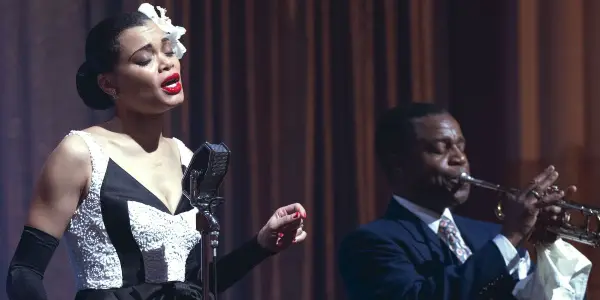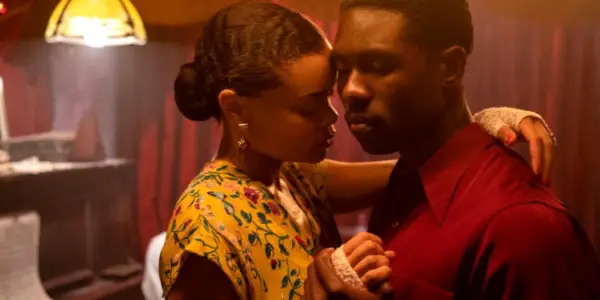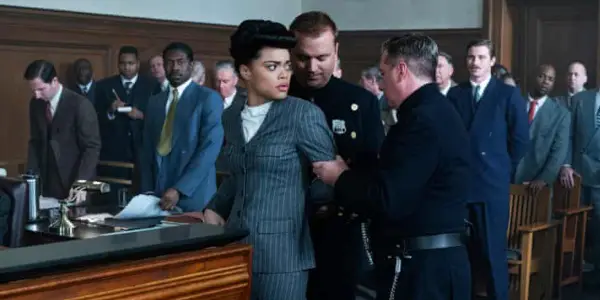THE UNITED STATES VS BILLIE HOLIDAY: A Decent Biopic, A Technical Mess

Stephanie Archer is 39 year old film fanatic living in…
In the last six months, films have come to light showcasing the cruelty and racially driven motivations of the United States Government – primarily within its Federal Bureau of Investigation – and the utilization of power to maintain a division of races and a suppression of equality. Where Judas and the Black Messiah and MLK/FBI focus directly on the FBI’s involvement in the removal of key Black rights movement figures, The United States vs. Billie Holiday examines the extended power of the Bureau, the narcotics division becoming a central figure in the suppression of a young singer determined to share her artistic expression – specifically, a song that shone a hard light on the accepted treatment of Blacks within the United States.
Yet, where it is an examination into an abuse of power, it is also a hard look into a young singer’s life, both the ups and downs – one that would raise her to fame yet further impede her ability to overcome her addiction. What The United States vs Billie Holiday presents is an in-depth look into a woman whose struggles went beyond the music industry she was immersed within, but into her deeply rooted fight against addiction, abuse and harassment. Her story was not as simple as it may appear, success achieved many times at the sacrifice of self – and her lasting legacy, at times, a sacrifice of freedom.
Two Days
The United States vs Billie Holiday is a multilayered biopic deserving not only a strong lens to capture its intricate nature but a strong body to encompass its central figure. Andra Day absolutely nails the role, giving herself over to the pain and triumph, embracing the struggles both known and unknown. If there was ever a reason to watch this film, it is because of her performance. There is no doubt as to why she garnered awards attention this season, her Golden Globe nomination making her a favorite to receive further recognition at the upcoming Academy Awards. And rightly so. She encapsulates the defiant spirit of Billie Holiday, giving viewers of all ages the opportunity to know a different side of the artist. She is regal, elegant and independent.

As the film moves through each avenue and segment of her life, Day does not hold back, giving her all, bringing chemistry, tension, and energy to each scene she inhabits and each person she interacts with. As Billie Holiday drew fans alike, she draws in the remaining cast, each circling around her as the performer she is bringing to life. There is a radiant, vivacious energy she delivers, and the cast works off it flawlessly, bringing their own talents in tow, culminating in a stand-out ensemble overall.
A Technical Mess
Yet, where the cast flourishes, the film proves to be more of a mess on the technical end. While The United States vs Billie Holiday makes for a nice biopic, it too struggles with its own self-identity. As the film transitions from scene to scene, the style continues to change throughout. It doesn’t help the narrative, becoming more distracting than meaningful. It’s as though the film did not know what it wanted to be or what it wanted to look like, caught in a mesh of ideas of style and look that never become entirely cohesive.

What really kills the energy and fluidity of The United States vs Billy Holiday is the film’s editing. And sadly, this is not a one-time thing. Starting from the very beginning, the editing is abrupt and sudden. Too often, it feels as though scenes and moments were due an extra 2 to 3 seconds more to feel less rushed, less urgent – less abrasive. While it may have been utilizing a harsh editing technique to reflect the nature and the struggle of Holiday, it distracts and disconnects the audience.
“I need help, not jail time”
Feminism, spousal abuse, manager abuse, racial crimes, and addiction all find their way into The United States vs. Billie Holiday – and many times with perfect execution. There is a relevancy that emanates from these moments and screams for attention. Not only for the understanding of the past but for a continued understanding of the present. What truly resonated was the consistent human behavior of treating these issues as punishable – as unworthy of attention and aid. As Billie Holiday is brought into the courtroom on drug charges for the first time, reporters swarming around her, she cries out, “I need help, not jail time”. A poignant statement that reverberates throughout the decades that would follow her.

While in the film she is referencing her need for help in response to her addiction, her words span a variety of issues. Too many societal issues continue to be answered with punishment, with little regard or change to address the deeply rooted issues that plague our nation. Too many are jailed and punished for decisions necessary to survive. Too many go without help because counseling and proper care are not available to them. Too often, many resolve themselves to situations of abuse and inequality because they do not have the resources they need to excel. Jail is not the answer. Counseling, reallotment of resources, and a reexamination of the issues is what is truly needed. The United States vs Billie Holiday is unafraid to make this front and center throughout its entirety, unafraid to shine a hard light on the and create a platform for conversation.
Conclusion: The United States vs. Billie Holiday
The United States vs. Billie Holiday is multilayered and nuanced in its messaging, brought to life on the strong performance of Andra Day. And while its editing and style will be jarring at times, disconnecting audiences for only a moment, Day draws the audience back in every time. A decent biopic that deserved more, The United States vs Billie Holiday presents an opportunity to get the conversation started.
The United States vs. Billie Holiday is currently streaming on Hulu.
Have you been the film? What are your thoughts? Any other favorite biopics? Let us know win the comments below!
Watch The United States vs. Billie Holiday
Does content like this matter to you?
Become a Member and support film journalism. Unlock access to all of Film Inquiry`s great articles. Join a community of like-minded readers who are passionate about cinema - get access to our private members Network, give back to independent filmmakers, and more.













